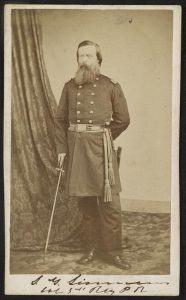Constant and Devoted Friends of the Soldier: Seneca and Elmira Simmons
The Pennsylvania Reserve Division is likely not one of the first to come to mind if you were asked to name a famous unit of the Army of the Potomac. Yet it was one of the hardest fighting divisions within that army. Unfortunately, those storied units often paid for their renown in blood. For the Pennsylvania Reserves, June 30, 1862, was one of those days.

In reality, the three battles–Mechanicsville, Gaines’ Mill, and Glendale–in which Brig. Gen. George McCall’s Keystone State division participated in during the Seven Days Campaign were a testament to the division’s fighting prowess. Overall, the final casualty count for the 13 Pennsylvania Reserve regiments totaled 318 killed, 1,176 wounded, and 1,573 captured. At the end of the June 30 Battle of Glendale, its high command looked drastically different from its appearance that morning. Division commander McCall was in the hands of the enemy. Truman Seymour, one of the three brigade commanders, supposedly wandered out of the fight. George Meade fell wounded and Col. Seneca Simmons, the last brigade commander, received a mortal wound.
Of the four commanders listed above, Seneca Galusha Simmons is the least well-known. He held the rare distinction of graduating from two military academies–Norwich in 1829 and the United States Military Academy at West Point in 1834. Simmons saw combat in Mexico and remained in the antebellum army until the outbreak of the Civil War. Supposedly, from his time spent in the south during his prewar service, southerners offered him multiple commands in the Confederate Army. He turned down each one.
Instead, he became a mustering officer for the state of Pennsylvania. “To him more is due than he has generally been given credit for,” wrote an admirer, “the organization, the discipline and the efficiency of that notable body of volunteers, the Pennsylvania reserves.” While a strict disciplinarian, Simmons’ soldiers in the 5th Pennsylvania Reserves liked him. “He had a big heart,” recalled one, “and was as grandly lenient as he was severely rigid.”
At Glendale, Simmons’ promising career ended. Two bullets–one to his liver and one to his lung–felled him. He did not die immediately though. Instead, Confederates captured the injured colonel. Simmons died the next night and likely rests in an unknown grave in Richmond National Cemetery. The Pennsylvania Reserves received the services of the likes of Truman Seymour and George Meade again after June 30 but war deprived them of Simmons’ potential.
Seneca Simmons left behind several children at home with his wife Elmira. Like her husband, she became attached to the veterans of the division. Before her death in 1886, she grew close with Pottsville, Pennsylvania’s Grand Army of the Republic Post No. 116, the Seneca Simmons Post. Shortly before she died, Elmira planned her own funeral. A United States flag draped her casket. Approximately 100 members of the Simmons post walked in front of the hearse. Dead marches set the tone of the procession. At her graveside, flowers fell from the hands of veterans onto her casket. Elmira “had always shown herself the constant and devoted friend of the soldier” like her husband.
Thank you for this wonderful article. Simmons was an excellent soldier who departed the scene too early. Where did the quotes in the article come from?
Thank you for reading. I found the quotes in an entry about Simmons in “Commemorative Biographical Encyclopedia of Dauphin County,” pgs. 291-95, which can be found here: https://books.google.com/books?id=qMswAQAAMAAJ&pg=RA2-PA294&lpg=RA2-PA294&dq=and+was+as+grandly+lenient+as+he+was+severely+rigid&source=bl&ots=ZLmyc_B_45&sig=ACfU3U2b9ZJb1eNStboMiFV2bFptSw5FTQ&hl=en&sa=X&ved=2ahUKEwjp0M_c4KrqAhXrhXIEHV-FChMQ6AEwAHoECAoQAQ#v=onepage&q&f=false.
Thank you.
A nicely-done post. McCall’s division should never have been placed where it was by McClellan (before he departed the field) given its status following Gaines’s Mill. The results were predictable.
In March 1882, Elmira Simmons published a letter in newspaper throughout the South, requesting information on the final moments of her husband, his gravesite, and the return of his personal belongings if any Confederate soldier had them. Do you have a copy of this letter, or can you locate it? Much thanks!